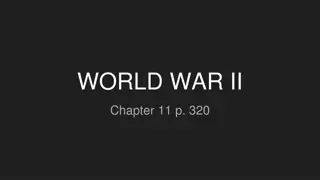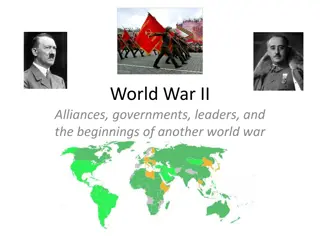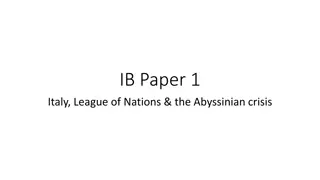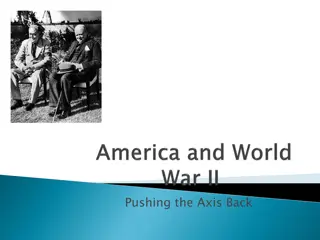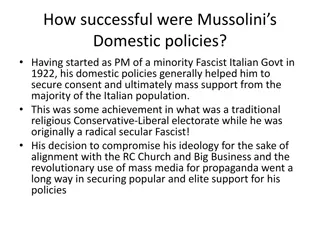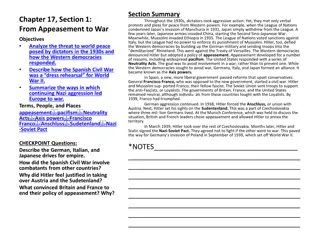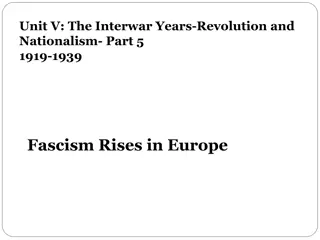The Rise of Totalitarian Regimes in World War II
In the aftermath of World War I, several European countries fell into economic depression and embraced totalitarian regimes led by leaders like Mussolini in Italy, Stalin in the Soviet Union, Hirohito in Japan, and Hitler in Germany. These leaders wielded total control over their citizens, militariz
0 views • 30 slides
The Rise of Dictators and the Beginnings of World War II
The content delves into the events leading up to World War II, highlighting key historical moments such as the rise of dictators like Hitler, Mussolini, and Stalin, along with significant milestones such as the invasion of Poland and the bombing of Pearl Harbor. It emphasizes the ideologies of fasci
0 views • 48 slides
The Rise of Fascism in Italy: The Reign of Mussolini
Italy's post-World War 1 chaos paved the way for Mussolini's rise to power as a dictator. Using violence and intimidation, the Fascists dismantled democracy, centralized power, and promoted extreme nationalism and militarism. Despite promises of order and greatness, Mussolini's regime suppressed dis
0 views • 22 slides
Rise of Mussolini in Italy and Weaknesses of the Liberal Monarchy
The historical timeline of Italy before 1919 led to Mussolini's rise to power through various events such as his involvement with the Italian Socialist Party and the formation of the Fascio di Combattimento. Italy's Liberal Monarchy faced weaknesses, including political divisions between progressive
0 views • 35 slides
Designing a Novel Low-Energy Beamline for NA61/SHINE at CERN
Carlo A. Mussolini from the University of Oxford, working at CERN, is designing a new low-energy beamline for NA61/SHINE experiment. The need for a low-energy beamline arises from the lack of particle production data in the 1-13 GeV/c momentum range. Current beam facilities at CERN face challenges w
0 views • 24 slides
Italian Foreign Policy in the Abyssinian War and its Aftermath
The Abyssinian War and its aftermath in the Middle East are explored through the lens of Italian foreign policy. The Mussolini-Laval Agreements of January 1935, the Anti-British line in the summer of 1935, and the Anglo-Italian rivalry all played significant roles in shaping events. Britain sought s
0 views • 28 slides
Italian Foreign Policy in the Middle East: Historical Perspectives
The historical analysis delves into Italian foreign policy in the Middle East, emphasizing the divergent scholarly views on Fascist-era objectives and the territorial aspirations of Mussolini's regime. It explores pre-Fascist interests, colonial endeavours, and the complex interplay between traditio
0 views • 21 slides
Abyssinian Crisis: Italy, League of Nations, and the Invasion of Abyssinia
The Abyssinian crisis of the 1930s was sparked by the Wal-Wal Incident, leading to the Italian invasion of Abyssinia. Mussolini's aims in invading Abyssinia included territorial expansion and revenge. Despite diplomatic efforts, the invasion occurred with Mussolini believing that the UK and France w
0 views • 11 slides
Allied Operations in World War II Leading to the Normandy Invasion
During World War II, strategic operations such as pushing Axis forces back in Italy, the Casablanca Conference decisions, and planning for the Normandy invasion played crucial roles in the eventual Allied victory. Key events included capturing Sicily, the arrest of Mussolini, agreements between worl
0 views • 8 slides
Mussolini's Domestic Policies: Success and Challenges
Mussolini's domestic policies as Prime Minister of a minority Fascist Italian government included compromises to align with the Catholic Church and Big Business, utilizing mass media for propaganda. While successful in gaining popular and elite support, his economic initiatives for self-sufficiency
0 views • 5 slides
Dictator Aggression and the Outbreak of World War II in the 1930s
Throughout the 1930s, dictators such as Hitler, Mussolini, and Japanese leaders took aggressive actions that threatened world peace. Western democracies responded with verbal protests and a policy of appeasement, allowing dictators to expand their empires unchecked. The Spanish Civil War served as a
0 views • 4 slides
The Rise of Fascism in Europe During the Interwar Years
Post-World War I, Europe faced economic turmoil leading to the rise of fascism, particularly in Italy under Mussolini. Fascism, a nationalist ideology, promoted authoritarian rule, suppression of opposition, and militaristic foreign policies. This extreme system attracted support due to promises of
0 views • 54 slides
